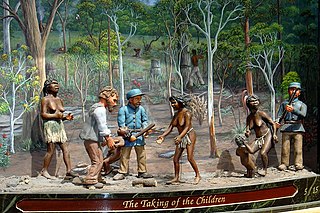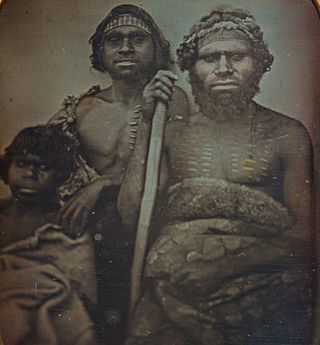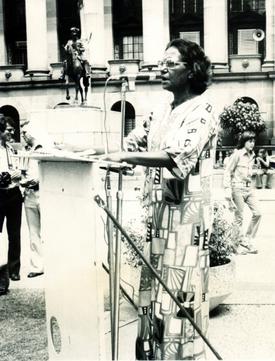
The Stolen Generations were the children of Australian Aboriginal and Torres Strait Islander descent who were removed from their families by the Australian federal and state government agencies and church missions, under acts of their respective parliaments. The removals of those referred to as "half-caste" children were conducted in the period between approximately 1905 and 1967, although in some places mixed-race children were still being taken into the 1970s.

Judith Arundell Wright was an Australian poet, environmentalist and campaigner for Aboriginal land rights. She was a recipient of the Christopher Brennan Award.

Neville Thomas Bonner AO was an Australian politician, and the first Aboriginal Australian to become a member of the Parliament of Australia. He was appointed by the Queensland Parliament to fill a casual vacancy in the representation of Queensland in the Senate, and later became the first Indigenous Australian to be elected to the parliament by popular vote. Neville Bonner was an elder of the Jagera people.

Koori is a demonym for Aboriginal Australians from a region that approximately corresponds to southern New South Wales and Victoria. The word derives from the Indigenous language Awabakal. For some people and groups, it has been described as a reclaiming of Indigenous language and culture, as opposed to relying on European titles such as "Aboriginal". The term is also used with reference to institutions involving Koori communities and individuals, such as the Koori Court, Koori Radio and Koori Knockout.
Aden Derek Ridgeway is an Australian former politician. He was a member of the Australian Senate for New South Wales from 1999 to 2005, representing the Australian Democrats. During his term he was the only Aboriginal member of the Australian Parliament. He is currently a spokesperson for Recognise, the movement to recognise Aboriginal and Torres Strait peoples in the Australian Constitution.

Torres Strait Islanders are the Indigenous Melanesian people of the Torres Strait Islands, which are part of the state of Queensland, Australia. Ethnically distinct from the Aboriginal peoples of the rest of Australia, they are often grouped with them as Indigenous Australians. Today there are many more Torres Strait Islander people living in mainland Australia than on the Islands.

Oodgeroo Noonuccal ( UUD-gə-roo NOO-nə-kəl; born Kathleen Jean Mary Ruska, later Kath Walker was an Aboriginal Australian political activist, artist and educator, who campaigned for Aboriginal rights. Noonuccal was best known for her poetry, and was the first Aboriginal Australian to publish a book of verse.
Salt Pan Creek is an urban watercourse of the Georges River catchment, located in the Canterbury-Bankstown region of Sydney, in New South Wales, Australia.

Larissa Yasmin Behrendt is an Australian legal academic, writer, filmmaker and Indigenous rights advocate. As of 2022 she is a professor of law and director of research and academic programs at the Jumbunna Institute for Indigenous Education and Research at the University of Technology Sydney, and holds the inaugural Chair in Indigenous Research at UTS.
The languages of Australia are the major historic and current languages used in Australia and its offshore islands. Over 250 Australian Aboriginal languages are thought to have existed at the time of first European contact. English is the majority language of Australia today. Although English has no official legal status, it is the de facto official and national language. Australian English is a major variety of the language with a distinctive accent and lexicon, and differs slightly from other varieties of English in grammar and spelling.
Kevin John Gilbert was an Aboriginal Australian author, activist, artist, poet, playwright and printmaker. A Wiradjuri man, Gilbert was born on the banks of the Lachlan River in New South Wales. Gilbert was the first Aboriginal playwright and printmaker. He was an active human rights defender and was involved in the establishment of the Aboriginal Tent Embassy in 1972 as well as various protests to advocate for Aboriginal Australian sovereignty.

Samuel William Watson, also known as Sammy Watson Jnr, was an Aboriginal Australian activist from the 1970s, who in later life stood as a Socialist Alliance candidate. He is known for being a co-founder of the Australian Black Panther Party in 1971/2. Through work at the Brisbane Aboriginal Legal Service in the early 1990s, Watson was involved in implementing the findings of the Royal Commission into Aboriginal Deaths in Custody. From 2009 was deputy director at the Aboriginal and Torres Strait Islander Studies Unit at the University of Queensland.
Indigenous Australians are people with familial heritage from, and/or recognised membership of, the various ethnic groups living within the territory of present day Australia prior to British colonisation. They consist of two distinct groups, which includes many ethnic groups: the Aboriginal Australians of the mainland and many islands, including Tasmania, and the Torres Strait Islanders of the seas between Queensland and Papua New Guinea, located in Melanesia. The term Aboriginal and Torres Strait Islander peoples or the person's specific cultural group, is often preferred, though the terms First Nations of Australia, First Peoples of Australia and First Australians are also increasingly common; 812,728 people self-identified as being of Aboriginal and/or Torres Strait Islander origin in the 2021 Australian Census, representing 3.2% of the total population of Australia. Of these Indigenous Australians, 91.4% identified as Aboriginal; 4.2% identified as Torres Strait Islander; while 4.4% identified with both groups. Since 1995, the Australian Aboriginal flag and the Torres Strait Islander flag have been official flags of Australia.

The Quandamooka people are Aboriginal Australians who live around Moreton Bay in Southeastern Queensland. They are composed of three distinct tribes, the Nunukul, the Goenpul and the Ngugi, and they live primarily on Moreton and North Stradbroke Islands, that form the eastern side of the bay. Many were pushed out of their lands when the English colonial government established a penal colony near there in 1824. Each group has its own language. A number of local food sources are utilised by the tribes.
The Yugambeh–Bandjalangic peoples' are an Aboriginal Australian ethnolinguistic group identified by their use of one of more of the Yugambeh–Bundjalung languages and shared cultural practices and histories. There are roughly 15 individual groups, who together form a wider cultural bloc or polity often described as Bundjalung or "Three Brothers Mob".
Indigenous treaties in Australia are proposed binding legal agreements between Australian governments and Australian First Nations. A treaty could recognise First Nations as distinct political communities, acknowledge Indigenous Sovereignty, set out mutually recognised rights and responsibilities or provide for some degree of self-government. As of 2023, no such treaties are in force, however the Commonwealth and all states except Western Australia have expressed support previously for a treaty process. However, the defeat of the Voice referendum has led to a reversal by several state liberal and national parties in their support for treaty and a much more ambigious expressed position by state Labor parties and governments.
Alison Whittaker is a Gomeroi writer and a senior researcher at the University of Technology Sydney, Australia. A review in World Literature Today called her "Australia's most important recently emerged poet".









